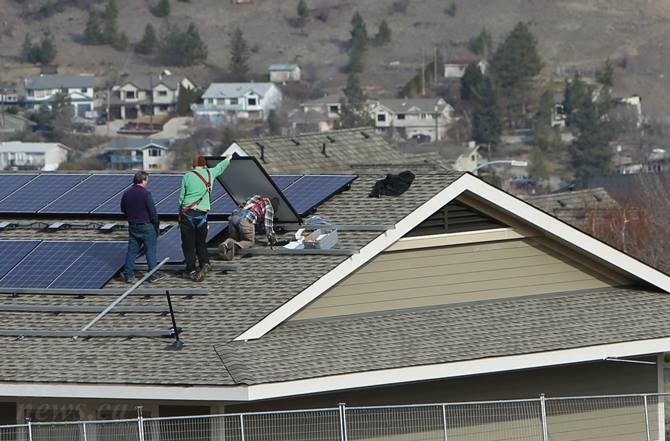
FILE PHOTO - Workers add solar panels to the renovated clubhouse at West Highlands Park.
(JENNIFER STAHN / iNFOnews.ca)
June 23, 2016 - 6:30 PM
KAMLOOPS - The city’s greenhouse gas targets appear to be a little out of range, but staff really aren't sure because they have not received emissions reports from the province in years.
With goals set in 2010 and a target of 2020, the City of Kamloops aimed to reduce its greenhouse gas emissions to 45 per cent below its 2007 levels. In the June 21 council meeting, sustainability supervisor Glen Cheetham told councillors the city itself is operating 5.6 per cent below 2007 levels.
“Since 2012 we’ve been on the right track,” he says. “We are optimistic that we will continue to see the same rate of progress.”
Over the past four years he says there’s an average decrease of 2.5 per cent. That trend doesn't predict future decreases though, because new technology and campaigns will come into use with unknown results.
The lowered emissions is good news to taxpayers. Typically lower emissions are the result of lower energy consumption, which means the city is spending less on fuel, Cheetham says. The more efficient energy use is due to two major factors: altering human behaviour, like turning off lights and idling vehicles, and technological advancements, such as more efficient boilers.
While the city is unlikely to meet the goal it set in 2010, Cheetham says the targets were aspirational, in part to create urgency. He also points out the city has grown since 2007, and emissions are being measured in totals, not per capita.
Where the entire community of Kamloops stands in relation to its targets is uncertain, a lack of reporting from the province means it's unclear how the community stacks up. The data from different stakeholders, like the city or heavy industry, is collected by the province and then shared with the communities. The province hasn’t reported back to the city about community emissions for years, Cheetham says.
“All the groups have been giving the province the data,” he says. “All of us are really keen to see the next update.”
The collected data was last provided to communities in 2010. The city tracks its own energy consumption, but not the entire community’s use.
To contact a reporter for this story, email Brendan Kergin or call 250-819-6089 or email the editor. You can also submit photos, videos or news tips to the newsroom and be entered to win a monthly prize draw.
We welcome your comments and opinions on our stories but play nice. We won't censor or delete comments unless they contain off-topic statements or links, unnecessary vulgarity, false facts, spam or obviously fake profiles. If you have any concerns about what you see in comments, email the editor in the link above.
News from © iNFOnews, 2016